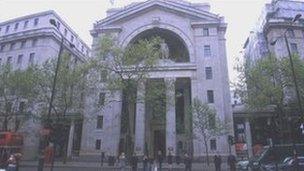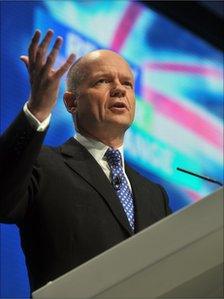BBC World Service - requiem or renaissance?
- Published

The transfer of funding of the World Service raises questions about the future shape of the organisation
The transfer of funding for the BBC World Service from the British government to the BBC itself is a surprising move at a time when many other governments are trying to increase their broadcasting and online influence.
At a stroke, the Foreign Office has lost its two main levers of control over the World Service - its budget (currently £272m or $428m a year) and its services (that is, what countries it broadcasts to and in what format).
Details of the deal have yet to be announced, though the Foreign Office is expected to retain a veto over the closure of any of the BBC's language services.
However, it is highly unlikely that the Foreign Office wanted any of these changes. They seem to have been driven by spending cuts.
Only in July, Foreign Secretary William Hague was trumpeting the value of the BBC World Service in a speech about the importance of "networking" in the modern world.
He spoke of "the essential importance of the work of the British Council and the BBC World Service, which give Britain an unrivalled platform for the projection of the appeal of our culture and the sharing of our values".
Independence issue
Of course the BBC will carry on doing this work anyway and there will be some who will welcome the cutting of the link with the Foreign Office.
It was always a curiously British arrangement that the Foreign Office would pay and the BBC would produce, but not everyone understood or accepted that.
Now at least, the BBC World Service can argue that it is more independent than it was. It will not be totally so because it is the British government which sets the level of overall funding for the BBC through the application of a levy on television sets.
It is still open for critics to repeat the phrase that irritates all BBC folk - that the BBC is a "state broadcaster".
But as the BBC does not seem to have been given any compensating funds to pay for the World Service, this decision raises huge questions about the future.
Increasingly, the old radio services, especially on short wave, are going and are being replaced by online and television, such as the Persian TV service the BBC runs.
What future for them in the wider BBC landscape?
And what about BBC Monitoring, which monitors and translates foreign news sources and is funded by the World Service and government?
It might not quite have the power it once did -- BBC correspondents at Commonwealth conferences used to be cultivated by certain heads of state in case the BBC had monitored signs of a coup, usually martial music, on their national radio stations.
But it is of immense value in tracking trends and crises.
Advertising?
Will these services be more commercialised? After all, the BBC News website, as accessed from outside the UK, now carries advertisements. Should the World Service do so?
And it will presumably be the BBC which will now choose where the services should be directed.
The Foreign Office it would seem has lost an important tool of diplomacy. It will not be able to say that it wants, for example, more broadcasting to Burma or less to Africa.

William Hague says the World Service is an unrivalled platform for British culture and values
Not such a bad thing, it might be argued. Perhaps the BBC will be able to make fewer policy-driven decisions and deliver ones driven more by demand.
In the Cold War it was easy. The BBC, Voice of America and Radio Free Europe knew what they were doing and knew why people listened.
The opposition put up their B team. Nobody was taken in by the old Radio Moscow, though the "Midnight in Moscow" theme tune was catchy.
There was even, I discovered after the Romanian revolution in 1989, a Romanian English-language radio station broadcasting abroad. It was largely run by a charming middle-aged chap who became the BBC translator during that crisis.
During the Falklands war, the British government set up its own short wave radio station called Radio Atlantico del Sur.
As I was in the Argentine capital, Buenos Aires, during that conflict I can confidently state that the only people who listened to it in my experience were myself and BBC colleagues checking on audibility, which was poor.
News and information is now a commodity in huge demand. In today's more open broadcasting environment, new thinking is required. But it would, most will agree I think, be a shame for the World Service to wither and die. I have lost count of the times that people in far-flung parts came up to me to express their gratitude - in Eastern Europe, Russia, Africa, the Middle East.
The world is not yet so free that it does not need as much access as it can get to free information.
Paul.Reynolds-INTERNET@bbc. co.uk
- Published20 October 2010
- Published19 October 2010
- Published2 August 2010
- Published16 September 2010
- Published8 September 2010
- Published2 August 2010